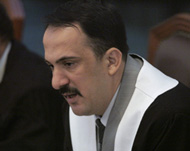Saddam appeals for a fair trial
Saddam Hussein, the former Iraqi president who is being tried for crimes against humanity, has questioned the fairness of the court trying him.

Saddam made his plea a day after Chief Judge Mohammed al-Ureybi switched off the toppled leader’s microphone and ejected him from the courtroom after he began a speech.
“When the accuser and prosecutor talk, microphones are open … the world listens, and people out there form their opinion according to what they hear. But, when the defendants speak, you switch off the microphone. Is this fair?” an unusually subdued Saddam politely asked the judge.
Al-Ureybi, who has taken a hard line with Saddam and six other co-defendants, said he would not allow political speeches in his court.
This request has been made by all the other judges who have tried Saddam, but Saddam has always dismissed their requests saying the whole court and the crimes attributed to him are politically motivated.
“The microphone issue is to bring order in the court. If you say anything within the law, then you can complain,” the judge said.
 |
|
Saddam said the new judge is an |
Al-Ureybi asked Saddam and his co-defendants not to leave the courtroom or provoke their ejection, saying it would negatively affect their case.
“Do not leave the court… Things are being said here and might involve you, so you have to be here to defend yourself,” he said.
Preserving the image
Dressed in a white shirt and dark suit, Saddam – who has said he does not fear death – said he was only trying to clear his name before history.
“Saddam Hussein does not care for Saddam Hussein as a person. He only cares for his reputation. When I make things clear, I do it for the Iraqi people and those outside.”
After listening to three Kurdish witnesses, Ureybi adjourned the trial until October. 17.
Saddam, 69, his cousin Ali Hassan al-Majeed, known as “Chemical Ali” by his victims, and five former commanders face charges of war crimes and crimes against humanity for their alleged role in the 1988 ‘Anfal’ (Spoils of war) military campaign.
Prosecutors say the offensive left 182,000 Kurds dead or missing.
Saddam and al-Majeed, who face death by hanging if convicted, are also charged with genocide.
 |
|
Saddam said false witnesses |
The court trying Saddam for a separate case – the killing of 148 Shia men from the town of Dujail in the 1980s – is due to reconvene on October 16 to review witness testimonies.
A senior source in the court has said a verdict in that case is expected within 10 days of that session opening.
Letter to court
Saddam has sent a letter to the Iraqi supreme tribunal court requesting not to attend the court sessions, protesting over the censorship of his words, and describing the newly appointed judge as an untrained lawyer.
He said he is badly represented because his Arab and foreign lawyers have been denied free access to the court proceedings. Some of Saddam’s lawyers have also been killed during the months-long trial.
“I would like to tell you that I do not have the desire to attend the court sessions, and if you see me there, you have to know that I was brought by force.
“I strongly refuse to be represented by lawyers appointed by the court, because they are nothing but actors ready to perform their roles in a US-directed and Zionist-Iranian inspired play [the trial],” the letter said.